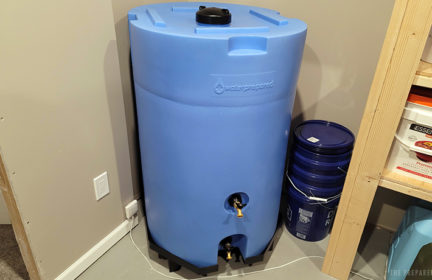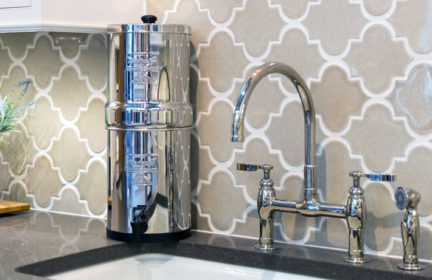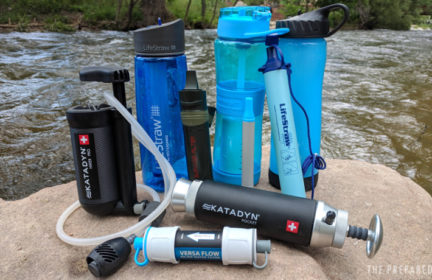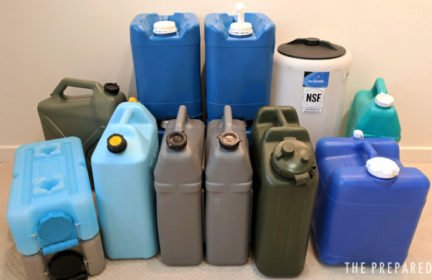Nuclear disaster and water purification
So, obviously we have quite a bit of water for emergency use, but at some point the stored water runs out. Does anyone have some good information on the best purification of water after nuclear disaster. I have read a combination of reverse osmosis and carbon filtering….
we have 2 wells on the property but one has an open holding tank 1500 gal which is great for most other disasters, but nuclear disaster would contaminate this one. We do have another and a well bucket, but concerned water would be contaminated by pulling it up or even through the ground.
-
Comments (8)
-
Eric - October 13, 2022
“one has an open holding tank 1500 gal which is great for most other disasters, but nuclear disaster would contaminate this one”
So this one is okay except for the open holding tank, right? Maybe find a way to close it so fallout couldn’t get in?
“We do have another and a well bucket, but concerned water would be contaminated by pulling it up or even through the ground.”
I’m not sure if I’m understanding this one correctly. You would hold a bucket in your hands, drop it into a hole in the ground, then pull it up again? If so, that would be difficult to avoid contamination of either the bucket or, via this hole, contamination of the ground water that both wells use.
”water would be contaminated by pulling it up or even through the ground.”
Radioactive material won’t move very quickly through the ground, so naturally the ground water should remain reasonably safe for a while. But if you (or your neighbor) leave a big exposed hole in the ground, that could allow a shortcut for everyone’s water to get contaminated.
Consider having a way to test for radioactivity in your water. That can help you decide if purification is needed or if your purification efforts are effective.
-
Holly Bradley - October 14, 2022
A well bucket is specifically designed to drop into a well. It is very long and narrow to go through the well cap, but like you said, it is a bucket so we would have to open the well cap and possible contamination.
Do you know of a specific way to test for nuclear fallout in water? We have a Geiger meter, but from my reading, they don’t test water well, not really designed for that. Any recommendations for a water tester?
And I believe that is a good recommendation to somehow cover that open area on the holding tank. Thank you for the response!!
-
Eric - October 14, 2022
This page talks about testing for radionuclides in well water. I would start there to get ideas about the options.
https://www.epa.gov/radtown/natural-radionuclides-private-wells
-
-
Eric - October 13, 2022
Relevant quote from “The Medical Implications of Nuclear War”:
“Initially groundwater supplies would remain unpolluted but they may be difficult to tap. Eventually, however, some groundwater could become contaminated, and remain so for some tens of years after a nuclear war. It would take hundreds or thousands of years for an aquifer to become pure (or nearly so) (van der Heijde, 1985). Doses from drinking this water would be small but, nonetheless, possibly above current water quality standards. In the long term, 90Sr and 137Cs (cesium-137) would be the major radionuclides affecting fresh water supplies.”
-
Holly Bradley - October 14, 2022
Thank you for your response!!! This validates what I thought. The water should be ok for a while, but difficult to get to. If we are outside with a bucket, pulling water up it could get contaminated. Probably best to get a solar well pump to pump the water up…..
-
-
Robert LarsonContributor - October 13, 2022
You may actually have radionuclides in your well water already, according to this article. You should test well water for contaminants every year and for radionuclides every three years. Their Seychelle Radiological bundle filters out things such as asbestos, lead, mercury, chemicals, pesticides, and then many radiological contaminants such as Gross beta, Alpha radium 226, Cesium 137 & 134, Uranium, and radon 222. In my opinon, the risk of a nuclear disaster is so small that a kit like this would be adequate enough for me to have something just in case, but not spend too much time, money, and energy figuring how to filter thousands of gallons.
Most likely if a nuclear disaster went on where you live, you’ll drink your stored water, then use something like that bundle for a while, but eventually and unfortunately you will realize that your water and land is contaminated for the next 10+ years and at least I would want to relocate somewhere else. I think most people have moved away from places like Fukishima and Chernobyl because they don’t want to live somewhere with constant radiation.
-
Holly Bradley - October 14, 2022
Thank you so very much for your response and the recommended bundle!!! And that would be my plan, stored water, then access to safe well water if needed, then move out if we have to. Just want to have a plan for protecting my family.
And we do have our water tested. It tested better than “city” water. We have a whole house filter as well…
-
Joker - October 14, 2022
In fact people had been returning to the area around Chernobyl until Putin’s invasion made the area too dangerous. Following the Chernobyl incident nuclear fallout was spread right around the northern hemisphere. Due to weather conditions a disproportionate amount of radioactive material fell on the hills of Wales in the UK. The levels of radioactivity have now fallen to acceptable levels that allow us to resume exporting lamb.
-
-
- Neutrality for the sake of survival and how to manage the full spectrum of ideologies - 20 hours ago
- Essential medical reference books for the prepper library - 23 hours ago
- News for the week of 2024-07-22 - 23 hours ago
- AR15 stock weight - 4 days ago
- Burning Candles - 5 days ago
This forum is heavily moderated to keep things valuable to as many people as possible. Full community policies are here. The basics:
- 1. Be nice to each other.
- 2. Stay focused on prepping.
- 3. Avoid politics, religion, and other arguments.
- 4. No unfounded conspiracies, fake news, etc.
- 5. Debate ideas, not people.



